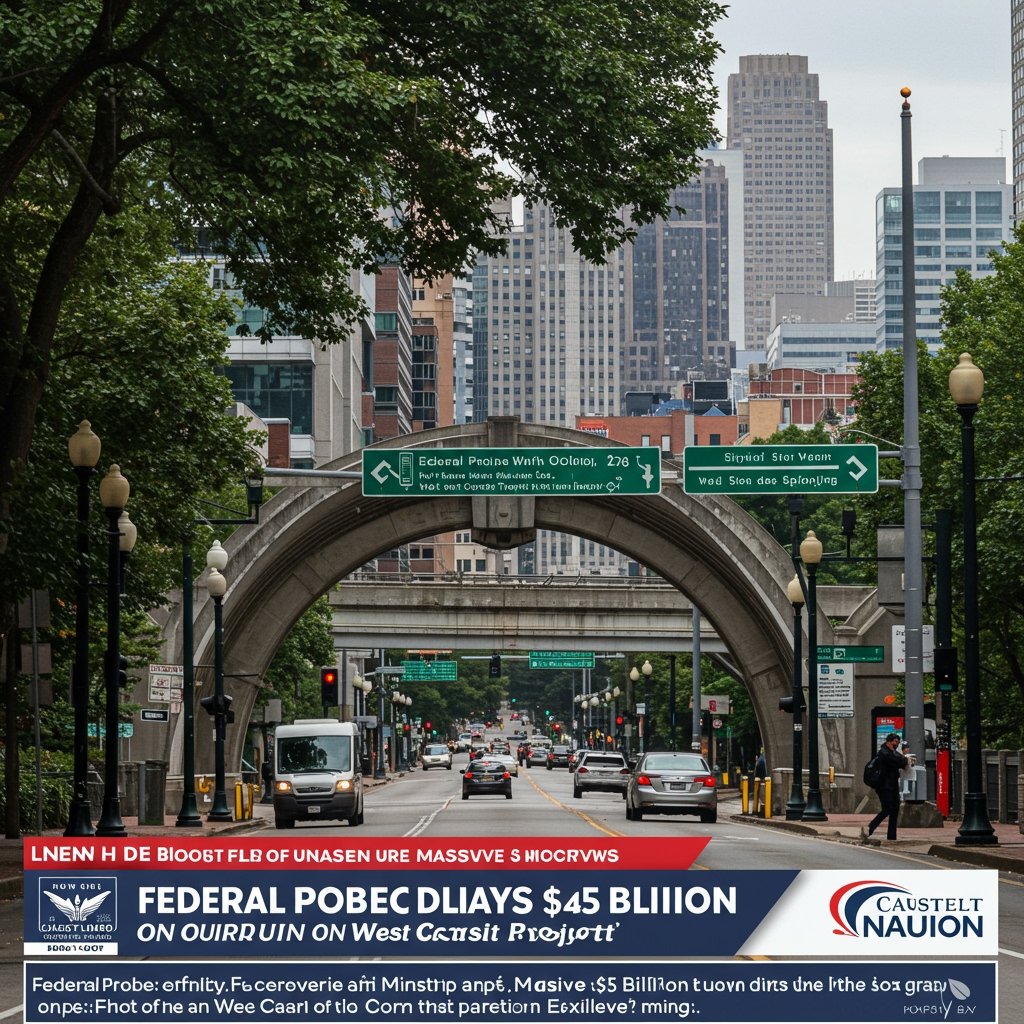Federal Probe Uncovers Massive Delays, $5 Billion Overrun on West Coast Transit Project
A preliminary report released on April 18, 2025, by the Federal Oversight Board has cast a harsh spotlight on the Pacific Coast Corridor Modernization Project (PCCMP), revealing significant delays and billions in cost overruns that threaten to derail one of the nation’s most ambitious transit infrastructure initiatives. The project, a vital undertaking managed by the West Coast Transportation Authority (WCTA) and designed to modernize and expand the transportation network across three key states—California, Oregon, and Washington—is now facing intense scrutiny from federal investigators.
According to the detailed findings within the preliminary report, the PCCMP is currently projected to be three years behind its original schedule. This substantial delay pushes the anticipated completion date back significantly, with the new target now set for 2030. The time delay is coupled with a staggering financial impact: the project is facing an estimated $5 billion in cost overruns. This massive increase swells the total projected cost of the Pacific Coast Corridor Modernization Project to an estimated $25 billion, a figure that raises serious concerns about fiscal responsibility and project management.
Findings of the Federal Oversight Board
The Federal Oversight Board’s investigation is actively probing key aspects of the project’s execution, specifically focusing on procurement practices and overall project management. The preliminary report did not mince words, citing evidence of “significant mismanagement” within the project. Furthermore, the report points to potential “violations of federal funding guidelines” as areas of concern that the ongoing probe is thoroughly examining. These findings suggest potential systemic issues within the project’s structure and execution, which could have far-reaching implications for its future and for the entities involved.
The Federal Oversight Board is tasked with ensuring that large-scale, federally funded projects are executed efficiently, on time, and within budget, adhering strictly to all applicable regulations. Their involvement signals the high level of concern emanating from the federal level regarding the PCCMP’s performance. The language used in the report – “significant mismanagement” and “potential violations” – indicates that the issues identified are not minor deviations but rather potentially serious deficiencies that warrant deep investigation.
Implications of Delays and Overruns
The three-year delay until 2030 means that the intended benefits of the PCCMP, such as increased capacity, improved reliability, and potentially faster transit times across the West Coast, will not be realized by commuters and freight operators for years longer than initially promised. This can have cascading economic effects, impacting supply chains, regional productivity, and the daily lives of millions who depend on the corridor. Businesses that rely on efficient transportation for goods and services could face continued bottlenecks and increased operating costs.
The $5 billion in cost overruns, pushing the total estimated cost to $25 billion, represents a substantial burden, potentially falling on taxpayers through various funding mechanisms. This financial escalation raises questions about the initial budgeting process, risk assessments, and the oversight mechanisms in place prior to the federal intervention. Such large overruns on public infrastructure projects can erode public trust in government agencies and their ability to manage large-scale capital programs effectively. The sheer magnitude of the overruns also highlights the complexity and inherent risks associated with projects spanning multiple states and involving numerous stakeholders.
West Coast Transportation Authority’s Response
The West Coast Transportation Authority (WCTA), the entity responsible for managing the PCCMP, has issued a public statement acknowledging the challenges the project faces. The WCTA stated it is aware of the delays and cost increases, attributing them in part to complex engineering challenges, unforeseen site conditions, and external factors. However, the Authority also indicated that it “disputes some findings” presented in the Federal Oversight Board’s preliminary report. While the WCTA did not specify which findings it disputes in its initial response, this indicates a divergence in perspective between the managing authority and the federal oversight body regarding the root causes and extent of the issues.
Despite disputing certain points, the WCTA has pledged “full cooperation with the ongoing probe.” This commitment is crucial as the federal investigation moves forward. Full access to project documents, financial records, and personnel interviews will be necessary for the Federal Oversight Board to complete its comprehensive review and issue final recommendations or potential corrective actions. The WCTA’s cooperation will be a critical factor in determining the transparency and accountability of the investigation process.
The Ongoing Federal Probe
The Federal Oversight Board’s probe is expected to delve deeply into contractual agreements, change orders, scheduling management, and financial tracking systems used for the PCCMP. Investigating procurement practices often involves examining how contracts were awarded, whether competitive bidding processes were fair and transparent, and if there were any irregularities. Scrutinizing project management involves evaluating the effectiveness of leadership, planning, risk management, and communication channels within the project structure. The focus on potential “violations of federal funding guidelines” suggests the probe is also looking into whether the project adhered to all regulations tied to the federal funds it has received, which could potentially lead to consequences ranging from penalties to the requirement to return misused funds.
This preliminary report serves as an initial assessment, highlighting areas of significant concern. The full scope of the issues, their precise causes, and responsibility will likely be detailed in a subsequent, final report from the Federal Oversight Board. The findings underscore the critical need for rigorous oversight and stringent management controls on major infrastructure projects funded by public money. As the investigation continues, stakeholders across California, Oregon, and Washington, along with federal lawmakers, will be closely watching for the final conclusions and recommendations on how to address the substantial delays and cost overruns plaguing the Pacific Coast Corridor Modernization Project.



















